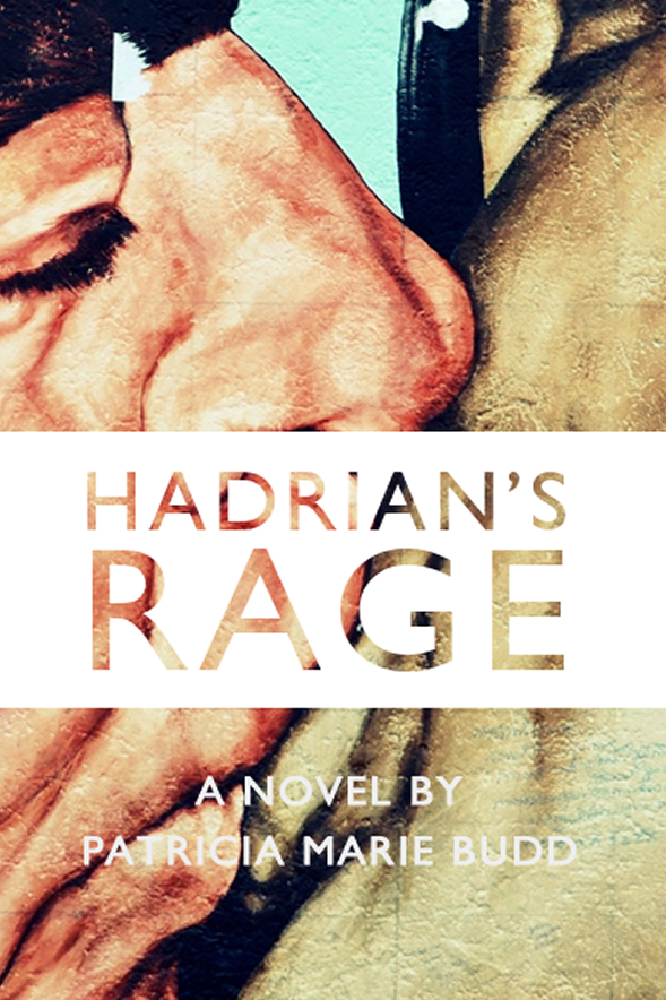The Hobbit by J.R.R. Tolkien
My brother gave me this book to read when I was in grade seven. Though this was not the first book to draw me deep into my mind and have me thrill in the adventures of its characters, I do remember it as being one of the more intense reading experiences of my youth. I was Bilbo Baggins as I read. I felt and feared and saw all that little Hobbit went through with the many adventures he was put through and my strength and courage grew and fermented inside along with this little character's. I so loved reading this novel that as soon as I started teaching English and our library ordered a class set for grade ten English I began teaching it. One of my favourite activities is to read the novel out loud for a class just as a gift for the true love of literature! The students love it (almost as much as when I show them the films).

Patricia Marie Budd
Roots: The Saga of an American Family by Alex Haley
This book was given to me by one of my sisters. (I am most fortunate to have come from a family of readers, all of whom loved to share in the wonders of literature with one another.) When I first picked up the book I told my sister there was no way I could read anything this long. I was in grade ten and though my entire youth had been spent reading I still allowed the typical teenage insecurities to overwhelm me. My sister promised me that if I just opened the book and started reading I wouldn't notice its length and would soon find myself at the end a lot faster than I could have believed possible. She was right. I was so caught up in the journey of Kunta Kinte and his lineage that when the book finally ended I was devastated. I wanted more! I need more so badly that I went back to the beginning and read the book again. Even during the second read I was entranced and couldn't put the book down. Visuals that linger in my mind still to this day include Kunta Kinte's first sexual relationship with an older woman, having his foot cut off to stop him from running, the birth of his first son and then, much later when the slave owner's daughter who had befriended one of the slaves eventually betrayed her. Well, I can still feel the sense of justification and deep satisfaction of this woman, no longer a naive girl but an old slave, as she spat into the glass of water asked of her by her old mistress.
Lolita by Vladimir Nabokov
I read this novel when I was in my early twenties. I was both horrified and fascinated by the central character. That a man could be so licentious as to marry a woman just so he could seduce her pre-teen daughter was frightening, especially since he was so successful at fooling the mother and flirting with the young girl who had no understanding of the dangerous games he initiated. The sad, rude awakening came for this child shortly after her mother died and her stepfather became her guardian and lover. I followed her brutal experience with horrified fascination. That Nabokov could present such a strong, realistic representation inside the mind of a pedophile and the suffering of youth at his hands made a lasting impact on me that reverberates to this day.
For Whom the Bell Tolls by Ernest Hemingway
Another powerful book read during my early twenties, For Whom The Bell Tolls, demanded that I reread it as soon as I finished the last line. Man's inhumanity to man is so clearly depicted in such gruesome and vivid detail that I remember physically shuddering while I read through some of the scenes. I have never forgotten the description of the rebels being decapitated, and then having had their heads placed on spikes as a warning by the fascists. I was also taken by the self-sacrifice of the protagonist near the end when, knowing he must be left behind, elects to hold back the fascists pursuing them in order to give the others a chance to flee rather than take the much easier way out by committing suicide. My heart was in my throat as Robert Jordon's heart pounded in his chest.
Pride and Prejudice by Jane Austen
Going back again to my teenage years I remember distinctly being Elizabeth Bennet. With her I detested Mr. Darcy. I scorned him for his arrogance and conceit and fell madly in love with the most affable Mr. Wickham. Like Elizabeth I was mortified to discover the true nature of my "favorite" and began to see how easily one can be deceived by appearances. This is a novel I have read time and time again, enjoying the luxury of Austen's descriptive writing style and the melodic flow of her character's dialogue. I own nearly every film version out there as well, even Sir Laurence Oliver's version. My favourite version, of course, is the six-hour mini-series starring Colin Firth (though I do love David Rintoul's portrayal of Mr. Darcy as much as I love Colin Firth's). I often refer to the Colin Firth version as my "Lion King".
Crime and Punishment by Fyodor Dostoyevsky
This novel was recommended to me by one of my Grade 12 students. She thought it was amazing and that I should teach it to my grade twelve English class. I borrowed her copy and instantly fell in love. Raskolnikov is such a complex anti-villain. His inability to be the hero he sees himself as; the Napoleon who can kill with immunity for the betterment of man renders him sickly and less than human. Caught in the denial of his failings he seeks redemption in the arms of a fallen woman. Only she can give him the grace needed to accept life as an ordinary human. For Raskolnikov, the hardest lesson of all was to accept that there are no extraordinary humans and that he, like everyone else, is just a man. He is a sympathetic to the reader in that his lesson is one that each and every one of us needs to learn.
Anna Karina by Leo Tolstoy
Anna Karina, for me, is not so much about Anna Karina and her young lover Vronsky, as it is about the amazing relationship that struggles to form, fails, and then thrives between Kitty and Konstantin Levin. I followed their every movement from Kitty's desires for Vronsky through her loss and of both men into her estrangement of society until she encounters the ability to help others heal while herself being in great need of rest and restoration. After the healing of their love Levin and Kitty marry. The growth and true beauty of Kitty's character then comes to fruition when she nurses Levin's dying brother unto his death. When I read this novel I always find myself dreaming of finding Kitty's wisdom and strength in my own life. I know she was foolish in her youth, but so was I. More importantly, though, is whom she chooses to become. And for that, I admire her.
Romola by George Elliot
I first learned of George Eliot from the first reader fan I ever met, Angie, whom I was introduced to by my dear friend Christine Marie Scott (owner of Centennial Books in Regina, Saskatchewan, Canada). Angie told me my novel ( A New Dawn Rising) reminded her of George Elliot's writing. I then determined to read George Elliot's work and after Silas Marner, Adam Bede and Middle March I happened upon Romola. I was stunned. How could anyone possibly compare me to this woman's work? Romola is such a stunning novel, and one so complex that even at forty-five years of age and nearly fifteen years of teaching English at the high school level I had to struggle to begin to understand what this author was saying. When I finally finished reading chapter one I had to go back and reread the chapter in order to understand enough of the story to carry on with chapter two. I had to do this for the first ten chapters of the book before I could finally get into the flow of what Elliot was saying. I refused to give up and I am forever grateful for the stubborn, determined nature I inherited from my mother. Romola is one of the most enchanting novels I have ever read, with a female protagonist who, though appearing weak and subservient, proves to be stronger than any male figure in the book. Romola is vibrant, beautiful, resilient, and a highly intelligent woman with but one human folly: her susceptibility to charm and love. And, yet, it is her capacity for love and devotion that brings her through the trails she must endure in order to forge ahead with her life, and, ironically enough, while embracing her husband's second wife and his children.
War and Peace by Leo Tolstoy
After tackling Romola I felt confident enough to pick up War and Peace by Leo Tolstoy. Reading Romola was like tossing a medicine ball up and down the gym making War and Peace the basketball that flies so smoothly from the hand immediately after. It took me three months to read the novel but it was well worth the effort. The way Tolstoy juggles plot and action with philosophical understandings of life as well as juxtaposing war and the trials of relationships is brilliant. One cannot help but wonder at the extraordinary growth of the awkward and foolish Pierre into the sanguine intellect that eventually finds truth and a center to his existence in the beautiful young Natasha, she who was originally destined to marry Andrew Bolkonski but had ruined her chances there by falling foolishly in love with a young handsome rouge only interested in winning her, using her and then abandoning her. I love that it is Pierre, the man she eventually marries, who saves her from this dastardly plot. It broke my heart, though, when Bolkonski died. For so long he had to suffer but Tolstoy does not make his suffering in vain. It is through Natasha's tender care giving of her lost fiancé, that she is able to regain honor in being. As with other books that permeate my soul, I read War and Peace twice. In fact I intend to pick it up again.
Little House in the Big Woods by Laura Ingles Wilder
This is the first book I remember reading. I know I read books before this, and had many books read to me, but Little House in the Big Woods was the first book to truly get me excited with reading. Ironically, I remember very little of this first book except that I had to read more. I couldn't wait until the weekend when mom or dad would take me to the library so I could get the next novel in the series. That there were more novels about this little girl's life thrilled me. I knew I would have to read every single one of them, and I did! Then I read them again and again and again until mom (or maybe it was dad, perhaps both) insisted I try reading something else. That's when they got me onto Anne of Green Gables by Lucy Maude Montgomery and I was at it again!


